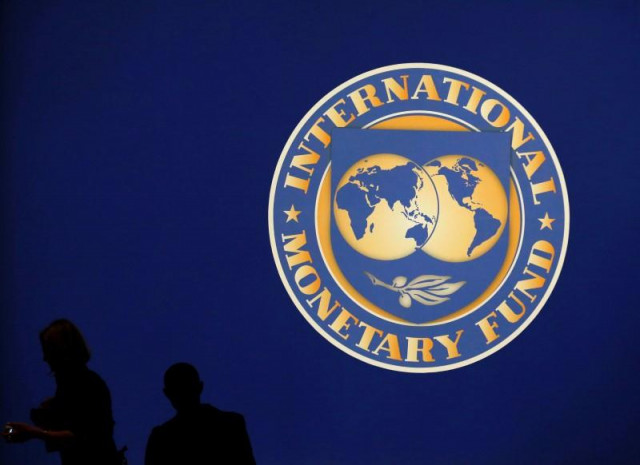Pakistan, IMF strike $6 billion deal
Staff level agreement on economic policies could be supported by a 39-month Extended Fund Arrangement

PHOTO: REUTERS
Foreign loans have exceeded $90 billion, and exports have registered a negative growth over the past five years, sheikh said while speaking to state-run Pakistan Television (PTV).
“So Pakistan will get $6 billion from the IMF, and in addition we will get $2 to $3 billion from the World Bank and Asian Development Bank in next three years,” he said.
“The trade deficit reaches $20 billion and our foreign exchange reserves dipped by 50 per cent in past two years. So we have a $12 billion gap in our annual payments and we don’t have capacity to pay them,” the senior official said.
A government report out Friday said that the country's growth rate is set to hit an eight-year low.
The report by National Accounts Committee forecast growth of a mere 3.3 per cent in the current fiscal year against a projected target of 6.2 per cent.
The staff level agreement on economic policies, which could be supported by a 39-month Extended Fund Arrangement (EFF), is aimed to support Pakistan’s strategy for stronger and more inclusive growth by reducing domestic and external imbalances, removing impediments to growth, increasing transparency, and strengthening social spending, said a statement issued on IMF's official website.
The Pakistani authorities and the IMF team have reached a staff level agreement on economic policies that could be supported by a 39-month Extended Fund Arrangement (EFF) for about US$6 billion – IMF’s Ramirez Rigo ~/link.aspx?_id=AF87153FFB434479AD96C521FE57F27D via @imfnews
— ADBPakistan (@PakistanADB) May 12, 2019
“An ambitious structural reform agenda will supplement economic policies to rekindle economic growth and improve living standards,” the statement read, adding that, “Financing support from Pakistan’s international partners will be critical to support the authorities’ adjustment efforts and ensure that the medium-term program objectives can be achieved.”
Led by its Washington-based mission chief Ernesto Rigo, an IMF team visited Islamabad from April 28 to May 11. The visit was originally scheduled to end on May 10, however, Rigo stayed in Pakistan for one more day to conclude the deal.
“This agreement is subject to IMF management approval and to approval by the Executive Board, subject to the timely implementation of prior actions and confirmation of international partners’ financial commitments,” Rigo said in a statement.
Bailout talks with IMF hit last-minute snag
“The EFF aims to support the authorities’ ambitious macroeconomic and structural reform agenda during the next three years. This includes improving public finances and reducing public debt through tax policy and administrative reforms to strengthen revenue mobilisation and ensure a more equal and transparent distribution of the tax burden. At the same time, a comprehensive plan for cost-recovery in the energy sectors and state-owned enterprises will help eliminate or reduce the quasi-fiscal deficit that drains scarce government resources. These efforts will create fiscal space for a substantial increase in social spending to strengthen social protection as well as in infrastructure and human capital development. The modernization of the public finance management framework will increase transparency and spending efficiency. Provinces are committed to contribute to these efforts by better aligning their fiscal objectives with those of the federal government.
“The forthcoming budget for FY2019/20 is a first critical step in the authorities’ fiscal strategy. The budget will aim for a primary deficit of 0.6 per cent of GDP supported by tax policy revenue mobilisation measures to eliminate exemptions, curtail special treatments, and improve tax administration. This will be accompanied by prudent spending growth aimed at preserving essential development spending, scaling up the Benazir Income Support Program and improve targeted subsidies, with the goal of protecting the most vulnerable segments of society.
“The State Bank of Pakistan will focus on reducing inflation, which disproportionately affects the poor, and safeguarding financial stability. A market-determined exchange rate will help the functioning of the financial sector and contribute to a better resource allocation in the economy. The authorities are committed to strengthening the State Bank of Pakistan’s operational independence and mandate.
“An ambitious structural reform agenda will supplement economic policies to rekindle economic growth and improve living standards. Priority areas include improving the management of public enterprises, strengthening institutions and governance, continuing anti-money laundering and combating the financing of terrorism efforts, creating a more favorable business environment, and facilitating trade. To improve fiscal management the authorities will engage provincial governments on exploring options to rebalance current arrangements in the context of the forthcoming National Financial Commission."
Earlier on Saturday, talks between Pakistan and the IMF reached a deadlock due to change in goalpost by the fund and the prime minister’s reservations over heavy taxation, resulting into extension in parleys.
With additional input from AFP



















COMMENTS
Comments are moderated and generally will be posted if they are on-topic and not abusive.
For more information, please see our Comments FAQ